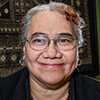Tongan Language Week 6 – 12 September 2020
Efforts to maintain the Tongan language among Tongan children in Aotearoa must facilitate transmission in the Tongan community. This can happen only if Tongan parents and adults are willing to use the language at home.

There is a telling difference between Tongan language revitalisation in Aotearoa and the revitalisation of Te Reo Māori. If children in a Māori household have lost their reo it is likely to be because the parents have lost their reo too and cannot use it with the children at home. But in many Tongan households in Aotearoa where the children have lost their Tongan reo, it is likely to be because the parents, despite their fluency in the reo, do not use it with their children at home.
So it is in many other Pasifika households, and the result is sometimes called voluntary language shift, as opposed to forced language shift. The latter is when the usually colonised population is forced to give up their language and adopt instead the dominant international language, usually that of the coloniser. Voluntary language shift happens because parents and adults are prepared to sacrifice their first language, maybe without really understanding the consequences, and instead use English as the language of the family.
The thinking, which is admirable, is that using the English language will help the family connect with English-speaking mainstream society in which are embedded the means for superior technology, paid employment, and better education for the children.
As for the Tongan language, adults use it among themselves, and at first they use it with the children, but after the children start attending primary school, the potency of English language acquisition takes over and they come home addressing their parents in English. Parents are pleasantly surprised to see such quick progress, compared to their memories of learning English back in Tonga. After a few weeks perhaps, they cease to respond in Tongan to their children and switch to English. They figure they too will learn more English if they use English with their children. They continue to use Tongan among themselves but use English whenever they address the children. Weeks of this elapse, months, years, and the children forget their Tongan.
It is understandable that parents would want their children to acquire English as fast as possible in Aotearoa. Where they stand at this point in time and place, it looks like the Tongan language is irrelevant to the children. I wish there was some simple way to explain that Tongan is never irrelevant because it carries thoughts and feelings, knowledge and understanding, world-views and identities, dreams and aspirations – and what it means to be a Tongan human being.
So the children of today will become parents themselves and they won’t be able to transmit the language to their children. And what’s more, some – perhaps many – of these children will one day yearn for their language. Research shows that many such children, now adults, feel disempowered and excluded from the Tongan flock – more than anything in the world they want to count as ‘real’ Tongans, and be accepted fully into the Tongan world without being marginalised as Tongans who speak only English. Sadly, as adults it is hard to learn Tongan as a second language if the goal is to become spontaneous speakers like them, the ‘true’ Tongans.
Research shows that the situation with Cook Islands Maori and Niuean is similar to that of Māori in that many adults in the household lack the tool of fluency for transmission, so there is greater dependence on government assistance in areas like increasing books for reading, teaching the languages in schools, and making good use of Language Weeks. In contrast, many Tongan parents possess the tool of fluency to transmit the language to their children, so perhaps the government can provide incentives for them to use those tools.
We often underestimate the potency of English language acquisition. Once Pasifika children go to primary school, they pick up the language in a matter of a few months, and once they have acquired English, they start thinking in it. We know they think in it when they talk spontaneously without being aware of the language; they are only aware that they are communicating, that is, thinking. The sociolinguistic situation that led them to acquire English, and hence think in it, is the community transmission of English as the main language of Aotearoa. Efforts to maintain Tongan among Tongan children in Aotearoa must facilitate and replicate a similar situation of transmission in the Tongan community. But only if Tongan parents and adults are willing to use the language at home with their children.
Dr Melenaite Taumoefolau is a senior lecturer in Pacific Studies in the Faculty of Arts at the University of Auckland.



